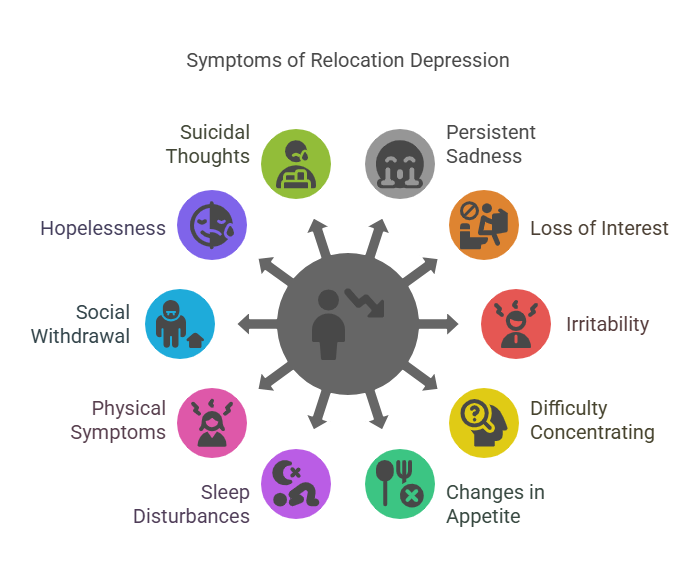Relocation to a new city is generally a fresh start, full of hope and promise. For many people, the excitement of it is accompanied by depression. One of the most common psychological effects of moving is relocation depression, a form of situational depression that is caused by stress and disruption of environmental change. In this article, we will explore the symptoms and causes of depression of relocation and will offer tips for managing it.

What Is Relocation Depression?
Depression after relocating is a psychological condition that people may face after moving to a new city or environment. Unlike general sadness or temporary stress, this type of depression involves persistent feelings of sadness, anxiety, and emotional distress that interfere with daily life.
“Relocating can be a drastic change, and all drastic changes can affect your mental health. You might experience symptoms of depression, such as feelings of sadness, lack of pleasure, and exhaustion.”
— Healthline
Its roots are from the complex process of leaving behind familiar surroundings, family and friends, social networks, and routines, and facing the new challenges of a new place.
Causes of Relocation Depression
Depression of moving to a new city can have some causes, which are:
· Loss of Social Support
Relocation usually results in separating close friends, family members, and known members of one’s community. The loss of such emotional support can result in feelings of isolation and loneliness.
· Breaking Routine:
Regular daily routines and environments make a stable schedule. When we move to a new place, we are broken, which can cause a sense of uncertainty.
· Uncertainty and Anxiety
Being in new settings, learning about new services, and finding your way in a new city is challenging. Uncertainty and fear of the unknown can increase stress levels.
· Logistical and Physical Stress:
The process of packing, coordinating, and physically movement of objects is exhausting and creates moving stress. People can make it easier by hiring professional movers.

Recognizing the Symptoms of Relocation Depression
Relocation depression has many symptoms that are common with clinical depression. You should know their differences between normal stress. Key symptoms are:
- Persistent sadness
- Loss of interest or pleasure in activities once enjoyed
- Irritability, frustration, or mood swings
- Difficulty in concentrating or decision-making
- Changes in appetite or weight
You can also experience these symptoms of relocation depression:
- Sleep disturbances, including insomnia or excessive sleeping
- Physical symptoms of headaches or stomachaches without an underlying medical cause
- Social withdrawal and isolation
- Feelings of hopelessness or worthlessness
- In serious cases, suicidal or self-injury
If relocation depression symptoms continue for over two weeks and cause a notable disruption to daily functioning, you need professional help.
Effective Strategies to Manage Relocation Depression
If you want to manage depression from moving to a new city and prevent mental health problems after moving to a new place, keep these coping strategies in mind:
- Accept Your Feelings
Just remember that you are human and that it is normal to feel sad, anxious, or overwhelmed after a move. Learning to accept rather than repress these emotions is the first step to being well again.
- Establish New Routines
If you feel depressed after moving to a new city, start new routes again. Little routines, such as regular meal times, exercise, and sleep schedules, can prevent mood swings and reduce anxiety.
- Maintain Connections
Stay in touch with friends and family back home as your trusted support systems. Frequent contact offers emotional support and lessens the sense of isolation.
- Spend Time in Social Groups
Have friendships and community relationships. Activities like joining a club, attending social functions, or volunteering can offer a sense of community and decrease loneliness.

- Get Familiar With Your New City
If you feel depressed after moving to a new city, try to expand your relationships and make new friends. Visit parks, shops, and other cultural recreational facilities to make yourself at ease with the new surroundings.
- Get Some Self-Care Activities
Carry out activities to promote body health, including diet, exercise, and sleeping enough. Practicing yoga is a useful tool for dealing with stress.
- Have Realistic Expectations
You should not forget that adjustment takes time and that ups and downs are normal. Avoid putting pressure on yourself to feel at home immediately.
- Seek Professional Support
If you still feel depressed after relocating or it worsens, consulting a mental health professional is essential. Therapy and counseling can provide coping tools and emotional support.
Additional Tips for a Smooth Adjustment to Decrease Relocation Depression
To reduce relocation depression, use your phone to explore your new area, apps can help you find local events, meet people, or even locate a good coffee shop. Try to keep a positive outlook. Yes, you’ve left things behind, but there’s a whole new chapter ahead. Set small goals. You can unpack just one box today or say hi to a neighbor, little things can give you a good feeling. And above all, be kind to yourself. Settling in takes time, and that’s perfectly okay.
How Professional Movers Can Ease the Transition
Every move has its own challenges that can intensify relocation stress. Professional moving companies such as Secure Moving play an important role in reducing this stress. Benefits of Hiring Professional Movers:
- Efficient Planning: Experienced movers will help you with packing, loading, transportation, and unloading.
- Reduced Physical Stress: Moving heavy furniture and boxes is physically hard. Professional movers will handle them safely and efficiently.
- Minimized Risk of Damage: If you hire movers, they will do proper packing and handling to protect your belongings. So it will reduce anxiety about loss or damage and also decrease relocation depression.
- Flexible Services: Many companies offer customizable options, including unpacking and setup, to meet individual needs.
- Local Expertise: Movers who are familiar with cities like Vancouver understand local logistics, traffic patterns, and regulations. So they can make the process smoother, and you will feel less stress.
Choosing a reliable Moving company in Vancouver can significantly reduce relocation stress and help you settle more comfortably in your new home.

Easy Relocating Process with Secure Moving Company
When you choose Secure Moving company that handles the hard work for you during the move, your stress will be decreased. With experienced movers who take care of your belongings, you can focus on settling into your new home, exploring your neighborhood, and building new routines that support your well-being. Make your relocation easy and stress-free and let our team do everything for you. Contact us today.
FAQs
- What is relocation depression and what causes it?
Relocation depression is a deep sadness or anxiety after moving that is often caused by leaving behind familiar people and places. - What are the common symptoms of relocation depression?
Feeling down, tired, lonely, anxious, or losing interest in things you used to enjoy are common symptoms. - How can I cope with stress and emotional challenges during a move?
We suggest you take it slow, stay connected to loved ones, explore your new area, and don’t be afraid to ask for help. - Can hiring professional movers reduce the risk of relocation depression?
Yes, letting experts handle the move will decrease stress so you can focus on adjusting emotionally. - Which moving companies in Vancouver offer supportive and stress-free relocation services?
Secure Moving Company in Vancouver is known for its smooth and careful relocation experience.









